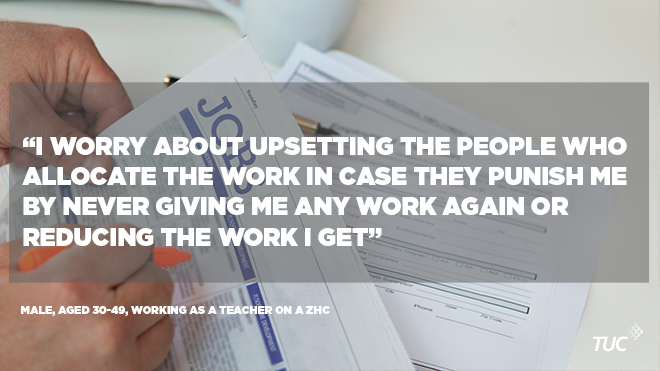
A right to request fixed hours is no right at all
A right to request fixed hours, however, is no right at all. It’s more of a vague hope.
To see why, we just need to look at the likely thought process behind submitting a request for fixed hours.
Two questions are probably going to pop up before you consider submitting such a request:
- Is it worth the risk?
- Is there a fair chance it’ll be accepted?
While the Taylor Review hopes the answer to these questions is “yes”. In reality, they’re barely maybes.
Would a worker take the risk?
Let’s start with the first question.
Those on zero hours contracts rely entirely on their bosses to allocate work to them each week. We know that one of the day-to-day experiences is a fear of falling out of favour with your boss, or getting a reputation as being unreliable.
If your employer does take a bit of a disliking to you, you can suddenly find yourself with no shifts and no income.
So what happens if you submit a request for guaranteed hours? At best, your employer accepts the request and the guaranteed hours are approved. At worst, however, the employer is irked by the request. They refuse it, as they’ll be entitled to do. They then don’t offer you as many shifts for the next few months.
If you have rent and bills to pay, is it worth the risk?
This’ll depend on whether you think the request would go down well.
Hundreds of people employed in insecure work have told us about their experiences. Many have been shouted at and threatened for wanting to take time off, either for sickness or holiday. It’s not always explicit threats. In some places, shame and guilt are used to coerce people into working.
Because of this, working people regularly drag themselves into work while sick and avoid using their annual leave.

In hostile work environments, it’s difficult to believe that a request for fixed hours is always going to be met positively. Workers with a lot to lose, who are already scared of asking for more hours, are unlikely to want to risk asking for a new right.
Is there a fair chance it’ll be accepted?
Due to financial risks, as well as the fear of missing out on future work, many of those in insecure work accept shifts whenever offered. They feel constantly on call.
This negatively impacts the employee, but benefits the employer. It provides them with a flexible workforce that can be used to meet demand, or lack of demand, at any given time.

This power dynamic means that employers can often get away with:
- Cancelling shifts at last minute
- Providing shift rotas late, leaving staff with little or no notice of when they’ll be working
- Sending staff home without pay when they’re not as busy as expected
On top of this, employers will be pretty safe in the knowledge that if they refuse a request for whatever reason, there’ll be little consequence for them.
Tribunal fees currently price low-paid workers out of enforcing their rights. The cost of holding an employer to account is too high for many, as seen by the sharp drop in tribunal claims since the introduction of fees.
So what else could we do?
It’s therefore not enough to offer a right to request.
Instead, the government should move towards banning the use of zero-hours contracts.
Those who work regular hours must have an enforceable right to a written contract that guarantees their normal working hours. It’s wrong that employers can drastically reduce someone’s hours and income for no reason. It allows bosses to ruin someone’s livelihood just because they’ve taken a bit of a disliking to them.
Those who are expected to work variable hours should be financially rewarded for the flexibility they provide. To do this, we need to ensure all workers receive additional pay for any non-contracted hours.
Fair play to the Taylor Review for looking at this. The Review says it will ask the Low Pay Commission to examine the case for a higher national minimum wage(NMW) rate for hours that are not guaranteed as part of the contract. We’ll want to discuss this with the Low Pay Commission. But in principle, we think a premium should be applied to all workers who have to work above their contracted hours, not just those on minimum wage.
Learning from elsewhere
Elements of this have recently been seen in the slow rise of “fair scheduling” laws in the United States. These laws legally require employers to provide advance notice of all shifts to workers. Workers receive compensation if shifts are cancelled. This protects against unpredictable work and pay.
It’s been introduced in a few cities but, thanks to Oregon’s state legislature, has recently been enacted on a state-level for the first time.
It’s interesting to read the report on the impact of irregular scheduling in Oregon. The section on workers’ experiences of irregular scheduling pretty much reads exactly like our own report and blog posts on irregular work.
They’re so similar that we could create a BuzzFeed-style quiz called “Guess Who Said This: An Oregonian Insecure Worker or a British Insecure Worker” and it would be impossibly difficult. It would also be a kinda grim quiz.
The Fair Work Week Act
So Oregon responded with its Fair Work Week Act. It requires certain companies to:
- Provide employees with a written work schedule at least a week before the first day of the working week. Employees can then request any additional shifts, and decline any new shifts not included on the schedule.
- Tell employees about changes to the schedule in a timely manner, allowing employees to decline work shifts not already included in the schedule
- Give new employees a written estimate of their work schedule. This must say the median number of hours the employee can expect to work in an average month.
- Let employees have a 10-hour rest period between shifts. Employees must receive 1.5 times their regular pay for any time worked during a rest period.
Companies can still have a “standby” list of employees who can be asked to work additional hours if there’s unexpected demand. However, this list must be voluntary and the employee must be able to request to be removed from the list. Those on the list must not be required to work any additional hours, it must remain opt-in.
Compensation for workers
Importantly, employers must compensate an employee if they change a schedule with less than seven days’ notice.
An employee must receive one hour of pay at their regular rate of pay, in addition to wages earned, when the employer:
- Adds more than 30 minutes of work to the employee’s work shift
- Changes the date or start or end time of the employee’s work shift with no loss of hours
- Schedules the employee for an additional work shift or on-call shift
As well as this, employees must receive 1.5 times their regular rate of pay per hour for each scheduled hour that they don’t work when the employer:
- Takes away hours from their work shift before or after the employee reports for duty
- Changes the date or start or end time of the employee’s work shift, resulting in a loss of working hours
- Cancels the employee’s work shift
- Does not ask the employee to perform work when the employee is scheduled for an on-call shift
Employees don’t receive compensation if they request these changes themselves.
It’s not perfect, but it’s a start
In some aspects, the act isn’t perfect. It only covers certain companies and industries. Compensation only kicks in when working time is changed by more than 30 minutes, and there’s a few potential loop holes around some of the compensation payments. And while employees can request not to work at certain times, the employer is under no obligation to accept.
Despite these flaws, the act will provide eligible employees with a better idea of their working hours and schedules. Workers will be ridded of the unpredictable hours they find so frustrating. The need to pay compensation may also encourage employers to provide accurate and timely work schedules or face financial costs.
Notably, politicians from both parties supported the bill.
But that’s not enough
Ultimately though, it wouldn’t be enough just to introduce a new right similar to the Fair Work Week Act.
For a right to be effective, tribunal fees must first be scrapped. This is for the same reasons as when we looked at enforcement last week. If people can’t enforce a right, that right is meaningless.
Stay Updated
Want to hear about our latest news and blogs?
Sign up now to get it straight to your inbox
